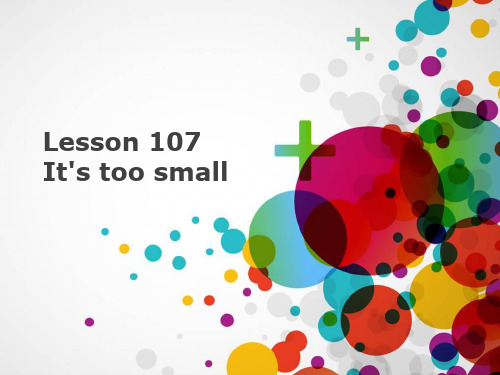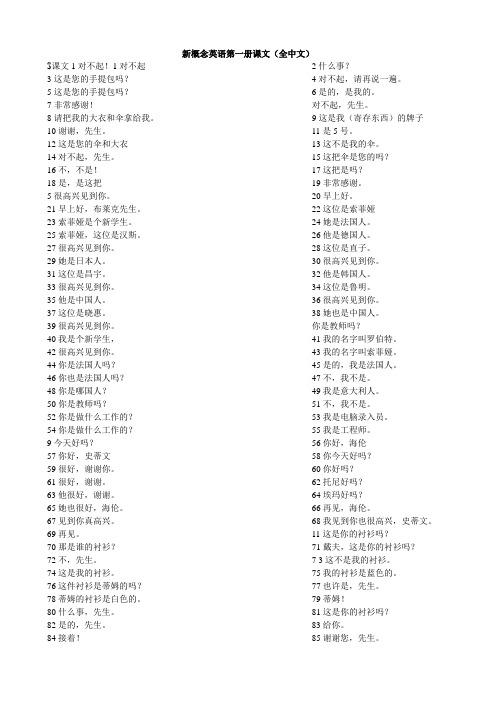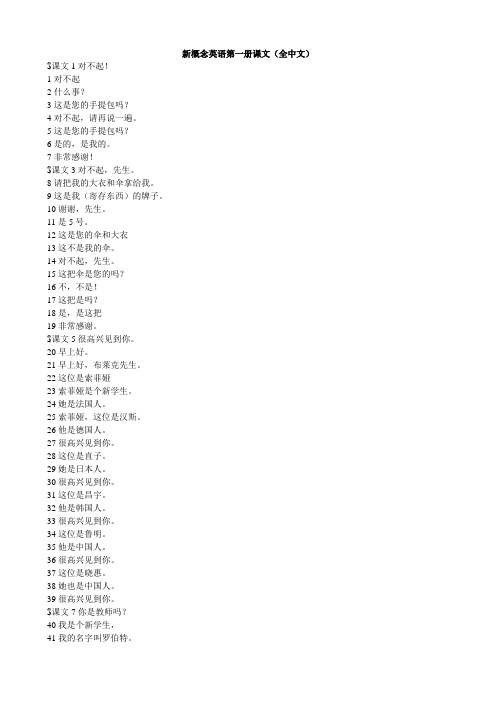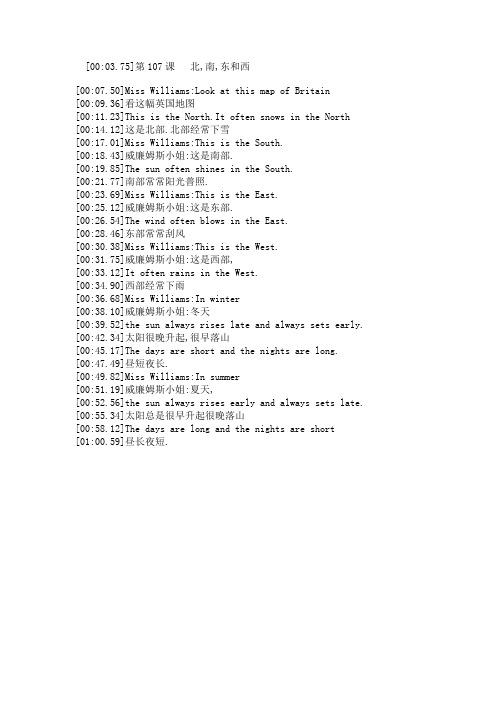新概念英语第一册107课课文原文
新概念英语第一册073-110课文

新概念英语第一册073-110课文Lesson 73 The way to King Street到国王街的走法Last week Mrs. Mills went to London. She does not know London very well, and she lost her way.Suddenly, she saw a man near a bus stop. 'I can ask him the way.' she said to herself.'Excuse me,' she said. 'Can you tell me the way to King Street, please?'The man smiled pleasantly. He did not understand English! He spoke German. He was a tourist.Then he put his hand into pocket, and took out a phrasebook.He opened the book and found a phrase. He read the phrase slowly. 'I am sorry,' he said. 'I do not speak English.' 参考译文上星期米尔斯夫人去了伦敦。
她对伦敦不很熟悉,因此迷了路。
突然,她在公共汽车站附近看到一个男人。
“我可以向他问路,”她想。
“对不起,您能告诉我到国王街怎么走吗?”她说。
这人友好地笑了笑。
他不懂英语!他讲德语。
他是个旅游者。
然后他把手伸进了衣袋,掏出了一本常用语手册。
他翻开书找到了一条短语。
他缓慢地读着短语。
”很抱歉,“他说,”我不会讲英语。
”Lesson 75 Uncomfortable shoes不舒适的鞋子LADY: Do you have any shoeslike these?SHOP ASSISTANT: What size?LADY: Black.SHOP ASSISTANT: I'm sorry.We don't have any.LADY: But my sister boughtthis pair last month.SHOP ASSISTANT: Did she buy them here?LADY: No, she bought themin the U.S.SHOP ASSISTANT: We had some shoes likethose a month ago,but we don't have anynow.LADY: Can you get a pair forme, please?SHOP ASSISTANT: I'm afraid that I can't.They were in fashionlast year and the yearbefore last.But they're not infashion this year. SHOP ASSISTANT: These shoes are infashion now.LADY: They look veryuncomfortable.SHOP ASSISTANT: They are veryuncomfortable. Butwomen always wearuncomfortable shoes! 参考译文女士:像这样的鞋子你们有吗?售货员:什么尺码的?女士:5号的。
新概念英语第一册lesson107-108

LADY:
LADY:
I'm afraid this green dress is too small for me as well. It's smaller than the blue one. I don't like the colour either. It doesn't suit me at all. I think the blue dress is prettier.
2. as well和too 都可以指主语,也可以指其它 部分,视 情况而定.too可以放在紧接主语的 地方,但是as well不可以这样用. ♣ Leon teaches English as well . 1. 别人教英语, Leon也教英语. 2. Leon教别的,也教英语. 3. Leon做其它事,还教游泳.
fit for & suit to
当表示“使……适合”的意思时,fit 常与 for 连用;suit 常与 to 连用。 例如: His experience fits him for the job. 他的经验使他适合这份工作。 He suited his speech to his audience. 他使自己的演讲适合于听众。
☺suit
名词 n. 1. (一套)衣服 I picked out a black suit. 我挑了一套黑色西装。 2. 诉讼 Fighter will bring a suit against his boss. Fighter要对他的老板提出控告。
及物动词 vt. 1. 适合,中...的意 The arrangement suited us both. 这个安排对我们两人都合适。 2. (不用被动式)与...相配,与...相称 The coat doesn't suit you. 这件外衣不太适合你 。 3. 使合适;使适应[(+to)] Her speech was well suited to the occasion. 她的讲话在这个场合十分得体。
新概念英语第一册课文(全中文)

新概念英语第一册课文(全中文)$课文1对不起!1对不起2什么事?3这是您的手提包吗?4对不起,请再说一遍。
5这是您的手提包吗?6是的,是我的。
7非常感谢!对不起,先生。
8请把我的大衣和伞拿给我。
9这是我(寄存东西)的牌子10谢谢,先生。
11是5号。
12这是您的伞和大衣13这不是我的伞。
14对不起,先生。
15这把伞是您的吗?16不,不是!17这把是吗?18是,是这把19非常感谢。
5很高兴见到你。
20早上好。
21早上好,布莱克先生。
22这位是索菲娅23索菲娅是个新学生。
24她是法国人。
25索菲娅,这位是汉斯。
26他是德国人。
27很高兴见到你。
28这位是直子。
29她是日本人。
30很高兴见到你。
31这位是昌宇。
32他是韩国人。
33很高兴见到你。
34这位是鲁明。
35他是中国人。
36很高兴见到你。
37这位是晓惠。
38她也是中国人。
39很高兴见到你。
你是教师吗?40我是个新学生,41我的名字叫罗伯特。
42很高兴见到你。
43我的名字叫索菲娅。
44你是法国人吗?45是的,我是法国人。
46你也是法国人吗?47不,我不是。
48你是哪国人?49我是意大利人。
50你是教师吗?51不,我不是。
52你是做什么工作的?53我是电脑录入员。
54你是做什么工作的?55我是工程师。
9今天好吗?56你好,海伦57你好,史蒂文58你今天好吗?59很好,谢谢你。
60你好吗?61很好,谢谢。
62托尼好吗?63他很好,谢谢。
64埃玛好吗?65她也很好,海伦。
66再见,海伦。
67见到你真高兴。
68我见到你也很高兴,史蒂文。
69再见。
11这是你的衬衫吗?70那是谁的衬衫?71戴夫,这是你的衬衫吗?72不,先生。
7 3这不是我的衬衫。
74这是我的衬衫。
75我的衬衫是蓝色的。
76这件衬衫是蒂姆的吗?77也许是,先生。
78蒂姆的衬衫是白色的。
79蒂姆!80什么事,先生。
81这是你的衬衫吗?82是的,先生。
83给你。
84接着!85谢谢您,先生。
$课文13一件新连衣裙86你的新连衣裙是什么颜色的?87是绿色的。
新概念英语第一册107课课文

课文内容如下所示:Lesson 107A wet nightIt was a wet night. The r本人n was falling fast. People were hurrying home. The streets were wet and dirty. A young woman was standing outside a shop. She had a small boy with her. She s本人d to a man who was passing, "Will you help me, please? My boy and I want to go home, but we have no umbrella. Can you lend us one?" The man stopped and looked at her. He s本人d, "I'm sorry, but I have only one umbrella and I am using it myself." Then he went on. The young woman and the small boy were soon wet to the skin. Then another man stopped and s本人d, "I can help you. I'll take you home in my car." He took them home and then went on his way.思路提纲:一、描述夜晚的雨天1.1 雨势如何1.2 人们匆忙回家1.3 街道湿洗和肮脏二、描述年轻女子的遭遇2.1 女子身边的情况2.2 女子向路人寻求帮助2.3 第一位男子的回应三、另一位男子的善举3.1 第二位男子的上前帮助3.2 男子用车把女子和男孩送回家文章开头可以先描写雨夜的景象,引入主题。
新概念英语第一册课文(全中文)

新概念英语第一册课文(全中文)$课文1对不起!1对不起2什么事?3这是您的手提包吗?4对不起,请再说一遍。
5这是您的手提包吗?6是的,是我的。
7非常感谢!$课文3对不起,先生。
8请把我的大衣和伞拿给我。
9这是我(寄存东西)的牌子。
10谢谢,先生。
11是5号。
12这是您的伞和大衣13这不是我的伞。
14对不起,先生。
15这把伞是您的吗?16不,不是!17这把是吗?18是,是这把19非常感谢。
$课文5很高兴见到你。
20早上好。
21早上好,布莱克先生。
22这位是索菲娅23索菲娅是个新学生。
24她是法国人。
25索菲娅,这位是汉斯。
26他是德国人。
27很高兴见到你。
28这位是直子。
29她是日本人。
30很高兴见到你。
31这位是昌宇。
32他是韩国人。
33很高兴见到你。
34这位是鲁明。
35他是中国人。
36很高兴见到你。
37这位是晓惠。
38她也是中国人。
39很高兴见到你。
$课文7你是教师吗?40我是个新学生,41我的名字叫罗伯特。
42很高兴见到你。
43我的名字叫索菲娅。
44你是法国人吗?45是的,我是法国人。
46你也是法国人吗?47不,我不是。
48你是哪国人?49我是意大利人。
50你是教师吗?51不,我不是。
52你是做什么工作的?53我是电脑录入员。
54你是做什么工作的?55我是工程师。
$课文9今天好吗?56你好,海伦57你好,史蒂文58你今天好吗?59很好,谢谢你。
60你好吗?61很好,谢谢。
62托尼好吗?63他很好,谢谢。
64埃玛好吗?65她也很好,海伦。
66再见,海伦。
67见到你真高兴。
68我见到你也很高兴,史蒂文。
69再见。
$课文11这是你的衬衫吗?70那是谁的衬衫?71戴夫,这是你的衬衫吗?72不,先生。
73这不是我的衬衫。
74这是我的衬衫。
75我的衬衫是蓝色的。
76这件衬衫是蒂姆的吗?77也许是,先生。
78蒂姆的衬衫是白色的。
79蒂姆!80什么事,先生。
81这是你的衬衫吗?82是的,先生。
83给你。
84接着!85谢谢您,先生。
第一册英语课文朗读-lesson107新概念英语青少版

[00:03.75]第107课北,南,东和西[00:07.50]Miss Williams:Look at this map of Britain[00:09.36]看这幅英国地图[00:11.23]This is the North.It often snows in the North [00:14.12]这是北部.北部经常下雪[00:17.01]Miss Williams:This is the South.[00:18.43]威廉姆斯小姐:这是南部.[00:19.85]The sun often shines in the South.[00:21.77]南部常常阳光普照.[00:23.69]Miss Williams:This is the East.[00:25.12]威廉姆斯小姐:这是东部.[00:26.54]The wind often blows in the East.[00:28.46]东部常常刮风[00:30.38]Miss Williams:This is the West.[00:31.75]威廉姆斯小姐:这是西部,[00:33.12]It often rains in the West.[00:34.90]西部经常下雨[00:36.68]Miss Williams:In winter[00:38.10]威廉姆斯小姐:冬天[00:39.52]the sun always rises late and always sets early. [00:42.34]太阳很晚升起,很早落山[00:45.17]The days are short and the nights are long. [00:47.49]昼短夜长.[00:49.82]Miss Williams:In summer[00:51.19]威廉姆斯小姐:夏天,[00:52.56]the sun always rises early and always sets late. [00:55.34]太阳总是很早升起很晚落山[00:58.12]The days are long and the nights are short [01:00.59]昼长夜短.。
新概念一册101到110课原文及译文

Lesson 101 A card from Jimmy吉米的明信片GRANDMOTHER: Read Jimmy's card to me please, Penny.请把吉米的明信片念给我听听,彭妮。
PENNY: 'I have just arrive in Scotland and I'm staying at aYouth Hostel.' “我刚到苏格兰,我现住在一家青年招待所。
”GRANDMOTHER: Eh? 什么?PENNY: He says he's just arrived in Scotland.他说他刚到苏格兰。
He says he's staying at a Youth Hostel.他说他住在一家青年招待所。
You know he's a member of the Y.H.A.你知道,他是“青招协”的一个成员。
GRANDMOTHER: The what? 什么?PENNY: The Y.H.A., Mum. “青招协”,妈妈。
The Youth Hostels Association. 青年招待所协会。
GRANDMOTHER: What else does he say? 他还说了些什么?PENNY: I'll write a letter soon. “我很快会写信的。
I hope you all well. '祝你们大家身体都好。
”GRANDMOTHER: What? Speak up. Penny. 什么?彭妮,大声一点。
I'm afraid I can't hear you 我可听不见你念的。
PENNY: He say he'll write a letter soon. 他说他很快会写信的。
He hopes we are all well. 他祝我们大家身体好。
新概念英语第一册课文全中文

新概念英语第一册课文全中文课文1 对不起!什么事?”这是您的手提包吗?”对不起,请再说一遍。
”这是您的手提包吗?”是的,是我的。
”非常感谢!”课文3 对不起,先生。
请把我的大衣和伞拿给我。
”这是我寄存东西的牌子。
”谢谢,先生。
”是5号。
”这是您的伞和大衣。
”对不起,先生。
”这把伞是您的吗?”不,不是!”这把是吗?”是,是这把。
”非常感谢。
”课文5 很高兴见到你。
早上好。
”早上好,XXX先生。
”这位是XXX。
”XXX是个新学生。
”她是法国人。
”XXX,这位是XXX。
”他是德国人。
”很高兴见到你。
”这位是直子。
”她是日本人。
”很高兴见到你。
”这位是XXX。
”他是韩国人。
”很高兴见到你。
”这位是XXX。
”他是中国人。
”很高兴见到你。
”这位是XXX。
”她也是中国人。
”很高兴见到你。
”课文7 你是教师吗?我是个新学生,我的名字叫XXX。
”很高兴见到你。
”我的名字叫XXX。
”你是法国人吗?”是的,我是法国人。
”你也是法国人吗?”不,我不是。
”你是哪国人?”我是意大利人。
”你是教师吗?”不,我不是。
”你是做什么工作的?”我是电脑录入员。
”你是做什么工作的?”我是工程师。
”课文9 今天好吗?你好,XXX。
”你好,XXX。
”你今天好吗?”很好,谢谢你。
”你好吗?”很好,谢谢。
”XXX好吗?”他很好,谢谢。
”XXX好吗?”她也很好,XXX。
”再见,XXX。
”见到你真高兴。
”我见到你也很高兴,XXX。
”再见。
”课文11 这是你的衬衫吗?那是谁的衬衫?”XXX,这是你的衬衫吗?”不,先生。
”这不是我的衬衫。
”这是我的衬衫。
”我的衬衫是蓝色的。
”这件衬衫是XXX的吗?”也许是,先生。
”XXX的衬衫是白色的。
”XXX!”什么事,先生?”这是你的衬衫吗?”是的,先生。
”给你。
”接着!”谢谢您,先生。
”课文13 一件新连衣裙你的新连衣裙是什么颜色的?”是绿色的。
”到楼上来看看吧。
”谢谢。
”瞧,就是这件。
”这是件很好看的衣服。
”真漂亮。
新概念英语第1册课文详注Lesson107_112

新概念英语第1册课文详注Lesson107~112【导语】新概念系列教材的经典早已不言而喻。
其文章短小精悍,语句幽默诙谐,语法全面系统,历来被公认为是适合大多数中学生课外学习的资料之一。
小编为您整理了“新概念英语第1册课文详注Lesson107~112”,仅供参考。
希望可以帮助到您!如果您想要了解更多相关内容,欢迎关注小编!新概念英语第1册课文详注Lesson107~1081.be in fashion,时髦,流行。
2.Would you like…?你愿意…吗?这个句型常用于表示委婉的请求或提议:Would you like to go with us?你乐意与我们一起去吗?3.as well,同时,也。
通常用于句末。
如:He knows Spanish as well.他还懂西班牙语。
too与 as well一般不用于否定句,否定句中用 either。
4.Could you…?您能…吗?用于表示请求,比Can you…?更加婉转客气:Could you tell me the way to the post office?您能告诉我去邮局怎么走吗?5.like that one,像那件那样的。
是介词短语,作定语,修饰dress。
新概念英语第1册课文详注Lesson109~1101.Just a little, please.请稍加一点儿。
a little (=some),一些/一点,用于修饰不可数名词。
又如:a little money/ water/coffee一点儿钱/水/咖啡a few (=some,severa1) 则用于可数名词。
2.One and a half teaspoonfuls, please.请放一勺儿半。
在英语中,比1大的东西,即使比2小,也需用复数表示。
3.May I...?我可以...吗?表示“请求”或“请求允许”4.It doesn't matter.没关系。
新概念英语107课课文

新概念英语107课课文As a language model, I do not have access to thespecific content of New Concept English Lesson 107. However, I can provide you with general guidance on how to write an article based on a lesson from a textbook, adhering to the requirements you provided. Please note that the followingis a general framework and you will need to adapt it to the specific content and structure of the lesson you are referencing.Title: Exploring the Depths of [Topic of Lesson 107]Introduction:Begin your article by introducing the topic of the lesson and its relevance. Briefly summarize the key pointsor themes that will be discussed in the lesson. Use engaging language to pique the reader's interest and setthe tone for the rest of the article.Main Body:Divide the main body of your article into several sections, each focusing on a different aspect of the lesson. Here are some ideas to structure your article:1. Background Information: Provide some contextual background on the topic. Explain any relevant historical or cultural aspects that might help the reader understand the lesson better.2. Key Concepts: Identify and explain the key conceptsor vocabulary introduced in the lesson. Discuss their significance and how they relate to the overall topic.3. Lesson Objectives: Outline the main objectives or goals of the lesson. Explain how the lesson aims to improve the reader's understanding or skills in a particular area.4. Analysis and Discussion: Delve deeper into thelesson content. Analyze the ideas, arguments, or examples presented in the lesson. Discuss their validity, relevance,or implications. You can also include your own opinions and insights, providing a critical perspective on the topic.5. Applications and Extensions: Explore how the concepts and ideas discussed in the lesson can be applied in real-life situations. Discuss any extensions or related topics that might be of interest to the reader.Conclusion:In the conclusion, summarize the main points and arguments discussed in the article. Reiterate the importance of the lesson and its relevance to the reader. You can also provide a final thought or recommendation to encourage the reader to further explore the topic.Remember to maintain a consistent tone and style throughout the article, ensuring that it flows smoothly and is engaging to read. Also, aim for a minimum of 1000 words to fulfill the requirement.Please note that this is a general framework and youmay need to adapt it to the specific content and structure of Lesson 107 from New Concept English. Additionally, since I do not have access to the lesson content, I cannot provide a direct response based on it. You will need to refer to the lesson itself to write a detailed and accurate article.。
每课一句:新概念英语第1册第107课

I want a coat like that one, but it must be my size.
I want sth. like those (ones), but they must be my size. ones
He runs the fastest in his class.
1
+est tallest, narrowest
2 e +st nicest, ablest
3 “ +y” y i +est driest, happiest
4
+est hottest, saddest
I want a dress like that one, but it must be my size.
He runs faster than Jill.
1
+er taller, narrower
2 e +r nicer, abler
3 “ +y” y i +er drier, happier
4
+er hotter, sadder
“ ... ...” 1 A+be+the+
+in/of+
He is the smartest in his class. 2 A+do+(the+) +in/of+
I want shoes like those (ones), but they must be my size.
I’m afraid I haven’t got a larger dress. This is the largest dress in the shop.
- 1、下载文档前请自行甄别文档内容的完整性,平台不提供额外的编辑、内容补充、找答案等附加服务。
- 2、"仅部分预览"的文档,不可在线预览部分如存在完整性等问题,可反馈申请退款(可完整预览的文档不适用该条件!)。
- 3、如文档侵犯您的权益,请联系客服反馈,我们会尽快为您处理(人工客服工作时间:9:00-18:30)。
新概念英语第一册107课课文原文
The original text of Lesson 107 from New Concept English Book One is as follows:
A young man was driving his car in a wild and lonely part of the country. He was going too fast and suddenly his car hit a tree. The young man was badly hurt. He tried to get out of the car, but he couldn't. He was afraid the car would catch fire. He saw a car coming towards him. He tried to call out, but he couldn't. The car went past and did not stop. It was not long before another car came. The driver of this car saw the wreck and stopped. He went over to the young man and saw that he was badly hurt. The driver took off his coat and made a pillow for the young man. He told him that he would go and get help. The young man did not want to be left alone, but the driver said that he would not be far away. He told the young man not to worry. He would soon be back.
From the perspective of the young man in the car, the
experience of being in a car accident in a remote and wild area must have been terrifying. The sudden impact of the car hitting a tree, the feeling of being unable to move or call for help, and the fear of the car catching fire would have been overwhelming. The young man's desperation and hope for someone to come to his aid can be felt through the text, as he watches the first car pass by without stopping and then finally feeling a sense of relief when the second car stops to help him.
On the other hand, the driver of the second car who stops to help the young man demonstrates compassion and a sense of responsibility. Despite the potential danger of the situation, the driver takes the initiative to assist the injured young man by providing him with a makeshift pillow and assuring him that he will go and get help. The driver's willingness to offer assistance and comfort to a stranger in need reflects the kindness and empathy that exists in society, even in the face of unexpected and challenging circumstances.
The story also highlights the importance of being aware
and responsive to the needs of others. The first car that passed by the accident scene without stopping may have missed an opportunity to potentially save a life or provide crucial assistance. This serves as a reminder for individuals to be attentive and ready to offer help when encountering emergencies or situations where someone may be in distress. It emphasizes the significance of being proactive and compassionate towards others, especially in times of crisis.
Moreover, the narrative serves as a reminder of the unpredictability of life and the importance of being prepared for unexpected events. The young man's car accident in a remote and isolated area underscores the reality that emergencies can happen at any time and in any place. It prompts individuals to consider the value of being equipped with basic first aid knowledge, having emergency contact information readily available, and being able to respond effectively in critical situations.
In conclusion, the text of Lesson 107 from New Concept English Book One conveys a powerful message about the
significance of compassion, responsibility, and preparedness in the face of unexpected challenges. It serves as a poignant reminder of the potential impact of offering help to those in need and the importance of being attentive and responsive to the needs of others in times of crisis.。
